Related Research Articles
Marriageable age, marriage age, or the age of marriage is the general age, a legal age or the minimum age subject to parental, religious or other forms of social approval, at which a person is legitimately allowed for marriage. Age and other prerequisites to marriage vary between jurisdictions, but in the vast majority of jurisdictions, the marriage age as a right is set at the age of majority. Nevertheless, most jurisdictions allow marriage at a younger age with parental or judicial approval, especially if the female is pregnant. Among most indigenous cultures, people marry at fifteen, the age of sexual maturity for both the male and the female. In industrialized cultures, the age of marriage is most commonly 18 years old, but there are variations, and the marriageable age should not be confused with the age of majority or the age of consent, though they may be the same.
Child marriage is a marriage or domestic partnership, formal or informal, between a child and an adult, or between a child and another child.

Forced marriage is a marriage in which one or more of the parties is married without their consent or against their will. A marriage can also become a forced marriage even if both parties enter with full consent if one or both are later forced to stay in the marriage against their will.

A child safety seat, sometimes called an infant safety seat, child restraint system, child seat, baby seat, car seat, or a booster seat, is a seat designed specifically to protect children from injury or death during vehicle collisions. Most commonly these seats are purchased and installed by car owners, but car manufacturers may integrate them directly into their vehicle's design and generally are required to provide anchors and ensure seat belt compatibility. Many jurisdictions require children defined by age, weight, and/or height to use a government-approved child safety seat when riding in a vehicle. Child safety seats provide passive restraints and must be properly used to be effective. However, research indicates that many child safety restraints are often not installed or used properly. To tackle this negative trend, health officials and child safety experts produce child safety videos to teach proper car seat installation to parents and caregivers.
Vani, or Swara (سوارہ), is a custom where girls, often minors, are given in marriage or servitude to an aggrieved family as compensation to end disputes, often murder. Vani is a form of arranged or forced child marriage, and the result of punishment decided by a council of tribal elders named jirga. Some claim Vani can be avoided if the clan of the girl agrees to pay money, called Deet (دیت). Vani, sometimes spelled Wani or Wanni, is a Punjabi word derived from "vanay," meaning blood. It is also known as Sak and Sangchatti in different regional languages of Pakistan.

Bilawal Bhutto Zardari is a Pakistani politician who served as the 37th Minister of Foreign Affairs, in office from 27 April 2022 to 10 August 2023. He became the chairman of Pakistan People's Party in 2007, following his mother's assassination. Bilawal belongs to the Bhutto family, a prominent political family of Pakistan and is the son of former Prime Minister Benazir Bhutto and President Asif Ali Zardari, and the grandson of former President Zulfikar Ali Bhutto. Bilawal had been a member of the National Assembly of Pakistan from 13 August 2018 till 10 August 2023. He re-elected as Member National Assembly of Pakistan in 2024 Pakistani general election from newly formed constituency NA-194 Larkana-I taken oath February 2024.

The Ministry of Women and Child Development, a branch of the Government of India, is an apex body for formulation and administration of the rules and regulations and laws relating to women and child development in India. The current minister for the Ministry of Women and Child Development is Annpurna Devi having held the portfolio since 2024.
The Hindu Marriage Act (HMA) is an act of the Parliament of India enacted in 1955 which was passed on 18 May. Three other important acts were also enacted as part of the Hindu Code Bills during this time: the Hindu Succession Act (1956), the Hindu Minority and Guardianship Act (1956), the Hindu Adoptions and Maintenance Act (1956).

The Child Marriage Restraint Act, 1929, passed on 28 September 1929, in the Imperial Legislative Council of India, fixed the age of marriage for girls at 14 years and boys at 18 years. In 1949, after India's independence, it was amended to 15 for girls, and in 1978 to 18 for girls and 21 for boys. It is popularly known as the Sarda Act, after its sponsor Harbilas Sharda. It came into effect six months later on 1 April 1930 and applied to all of British India. It was a result of social reform movement in India. Despite strong opposition from the British authorities, the legislation was passed by the British Indian Government which had a majority of Indians. However, it lacked implementation from the British Indian government, largely due to the fear of British authorities losing support from their loyal Hindu and Muslim communalist groups.

Child marriage in India, according to the Indian law, is a marriage where the woman and man both are younger than 21 years of age respectively. Most child marriages involve women, many of whom are poor socio-economic conditions.
Sangeet Sharada is an 1899 Marathi Sangeet Natak, written and directed by playwright Govind Ballal Deval. The play is considered as the first play in Marathi to showcase the social problems and broke the norms by dealing with the subject of child marriage when dramatic literature in India mainly focused on historical-mythological narrations.
Rehaai is a 2013 Pakistani television drama serial directed by Mehreen Jabbar and written by Farhat Ishtiaq. It originally started airing on 18 March 2013 on Hum TV. The serial stars Noman Ijaz, Samina Peerzada, Maria Wasti, Adnan Jilani, Rashid Farooqui, Yashal Nadeem, Nausheen Shah and Danish Taimoor. The drama series was produced by Kashf Foundation in collaboration with Momina Duraid. It highlights the stories of real-life Kashf clients, of the problems they face and have overcome with support for Kashf's microfinance services. The serial focuses on child marriage which is an endemic issue that low income families face in many parts of Pakistan. It was very heartening to see that post the airing of the show a great deal of debate emerged on child marriage and the Sindh Marriage restraint Act was promulgated http://sindhlaws.gov.pk/setup/publications/PUB-13-000734.pdf

The Prohibition of Child Marriage Act 2006 came into force on 1 November 2007 in India. It forbids child marriages, and protects and provides assistance to the victims of child marriages.
Child marriage is practiced in some parts of Pakistan, with the highest prevalence in the Sindh province. It disproportionately affects the girl child. According to UNICEF report from 2018, around 18% of the girls in Pakistan are married before the age of 18 giving it the lowest rate of child marriage in South Asia after Sri Lanka. Child marriage occurs most often in rural and the primary driving factor is poverty among the low-income households where education is minimal.

Tabassum Adnan is a Pakistani women's rights activist from the Swat Valley. She won the U.S. State Department's 2015 International Women of Courage Award for her efforts in seeking justice for Pakistani women.

Shareefa Hamid Ali, also known as Begum Hamid Ali, was an Indian feminist, nationalist, advocate, and political figure. She was the President of the All India Women's Conference in 1935, and one of the founding members of the United Nations Commission on the Status of Women in 1947 and debated a gender inclusive language in the Universal Declaration of Human Rights.

In Pakistan, there are two laws governing Hindu marriages. One is the Sindh Hindu Marriage Act of 2016 which is applicable in the Sindh province of Pakistan and another is the Hindu Marriage Act of 2017 which is applicable in Islamabad Capital Territory, Balochistan, Khyber-Pakhtunkhwa and Punjab provinces. However, there are no laws and amendments made to register a marriage between two Hindus- one from Sindh and another from a different Province. Most of its articles are borrowed from Hindu Marriage Act, 1955 of British India, which was passed by British Raj.
The legislative assembly of Pakistan has enacted several measures designed to give women more power in the areas of family, inheritance, revenue, civil, and criminal laws. These measures are an attempt to safeguard women's rights to freedom of speech and expression without gender discrimination. These measures are enacted keeping in mind the principles described by the Quran.

Hinduism is the second-largest religion in Sindh, numbering 4.17 million people and comprising 8.73 percent of the province's population in the 2017 Pakistani census. Sindh has the largest population and the highest percentage of Hindus in Pakistan. Sindh has the Shri Ramapir Temple, whose annual festival is the country's second-largest Hindu festival.
Dua Zehra Kazmi is a girl from Karachi, Pakistan who went missing from her home on 16 April 2022 and days after was found, married to a boy in Okara, Punjab. The case made headlines across the country and continued to dominate the news cycle for months.
References
- ↑ https://www.dawn.com/news/1112097Sindh Child Marriages Restraint Act comes into effect